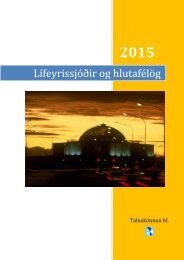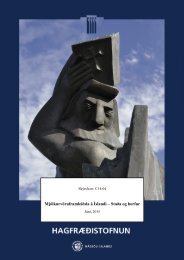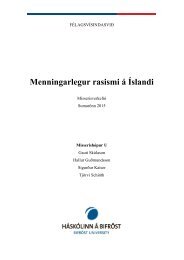You also want an ePaper? Increase the reach of your titles
YUMPU automatically turns print PDFs into web optimized ePapers that Google loves.
WORLD REPORT 2016<br />
HUMAN RIGHTS WATCH<br />
thorities to limit the number of children that members of designated groups can<br />
have.<br />
In contrast, the parliament did not pass the comprehensive Violence Against<br />
Women Law, a bill that would have strengthened women’s rights protections.<br />
Burmese civil society organization leaders who publicly criticized the laws were<br />
accused of being “traitors” by senior Ma Ba Tha officials and some reportedly<br />
faced death threats. In September, nine embassies in Rangoon made a public<br />
statement against the misuse of religion in the 2015 elections, sparking a rebuke<br />
from the Ministry of Foreign Affairs.<br />
While some political parties, notably the NLD, voted against the laws, other political<br />
figures promoted the laws as protecting Burma from Muslim threats. President<br />
Thein Sein took credit for the laws in a social media video as election<br />
campaigning began in September. Ma Ba Tha held a series of nationwide victory<br />
rallies lauding the laws as protecting the Buddhist faith against an Islamic “invasion”<br />
and in some cases declared its support for the USDP, marking its growing<br />
involvement in electoral politics.<br />
Prominent Ma Ba Tha member and leader of the “969” anti-Muslim boycott<br />
movement U Wirathu threatened the UN special rapporteur on Burma, Yanghee<br />
Lee, during her January visit to Burma, calling her a “bitch” and a “whore,” and<br />
exhorting followers to assault her. The government took no steps to respond to<br />
this incitement, and no prominent public figure in Burma has openly criticized<br />
the rising discrimination and threats endorsed by Ma Ba Tha or its intimidation<br />
of civil society.<br />
Freedom of Association and Assembly<br />
The numbers of political prisoners in Burma rose in 2015 as the government’s<br />
commitment to ending the imprisonment of activists waned. At year’s end, an<br />
estimated 112 people were incarcerated for alleged violations of the flawed<br />
Peaceful Assembly Law and other political offenses, a notable rise in cases since<br />
the large prisoner amnesties of 2012. At least 486 more were facing trial.<br />
The leadership of the joint committee overseeing political prisoner releases—<br />
composed of representatives of the government, former political prisoners, and<br />
political parties—was changed in February with the hardline deputy minister of<br />
home affairs, a serving military officer, made chair. Prominent activist Ko Bo Kyi<br />
was removed from the committee.<br />
On March 5, plainclothes police auxiliaries, suspected to be members of the<br />
Swann Arr Shin (Masters of Force), which had not been deployed against protesters<br />
since 2007, assaulted a small group of student protesters and activists from<br />
the 88 Generation Peace and Open Society Group who were peacefully assembling<br />
to criticize the government’s education law. Police then arrested the protesters.<br />
Five days later, on March 10, security forces blocked a small group of student<br />
protesters in the town of Letpadan from marching on Rangoon. When students<br />
attempted to tear down the barricades, police forces abandoned all discipline<br />
and violently assaulted the students, arresting over 80 of them. Students who<br />
were injured in the assault say they received only rudimentary medical care. At<br />
time of writing 50 students remain in custody in Tharrawaddy Prison on charges<br />
of rioting, assaulting police officials, and illegal assembly.<br />
After the March violence, the European Union, which has been providing technical<br />
assistance to the Burma police force as part of a community policing and<br />
crowd control project, criticized the authorities and called for an investigation. In<br />
September, the Myanmar National Human Rights Commission issued a report<br />
calling for abusive police to be punished, as well as any student demonstrators<br />
who may have acted to provoke officials. No police officers had been prosecuted<br />
at time of writing.<br />
Land rights activists in Burma are regularly arrested and charged with unlawful<br />
assembly and trespass for protesting land appropriation and displacement. Authorities<br />
arrested a number of land rights activists and farmers in Karen State in<br />
June and August who had been calling for compensation and redress for land<br />
they claim was unlawfully seized. Prominent activists such as Su Su Nway were<br />
also arrested in 2015, and authorities sentenced a number of leaders of the longrunning<br />
protests in the Letpadaung copper mine case in Monya, including veteran<br />
activist Naw Ohn Hla, to four years in prison for peaceful protests they led<br />
outside the Chinese embassy in Rangoon.<br />
140<br />
141










